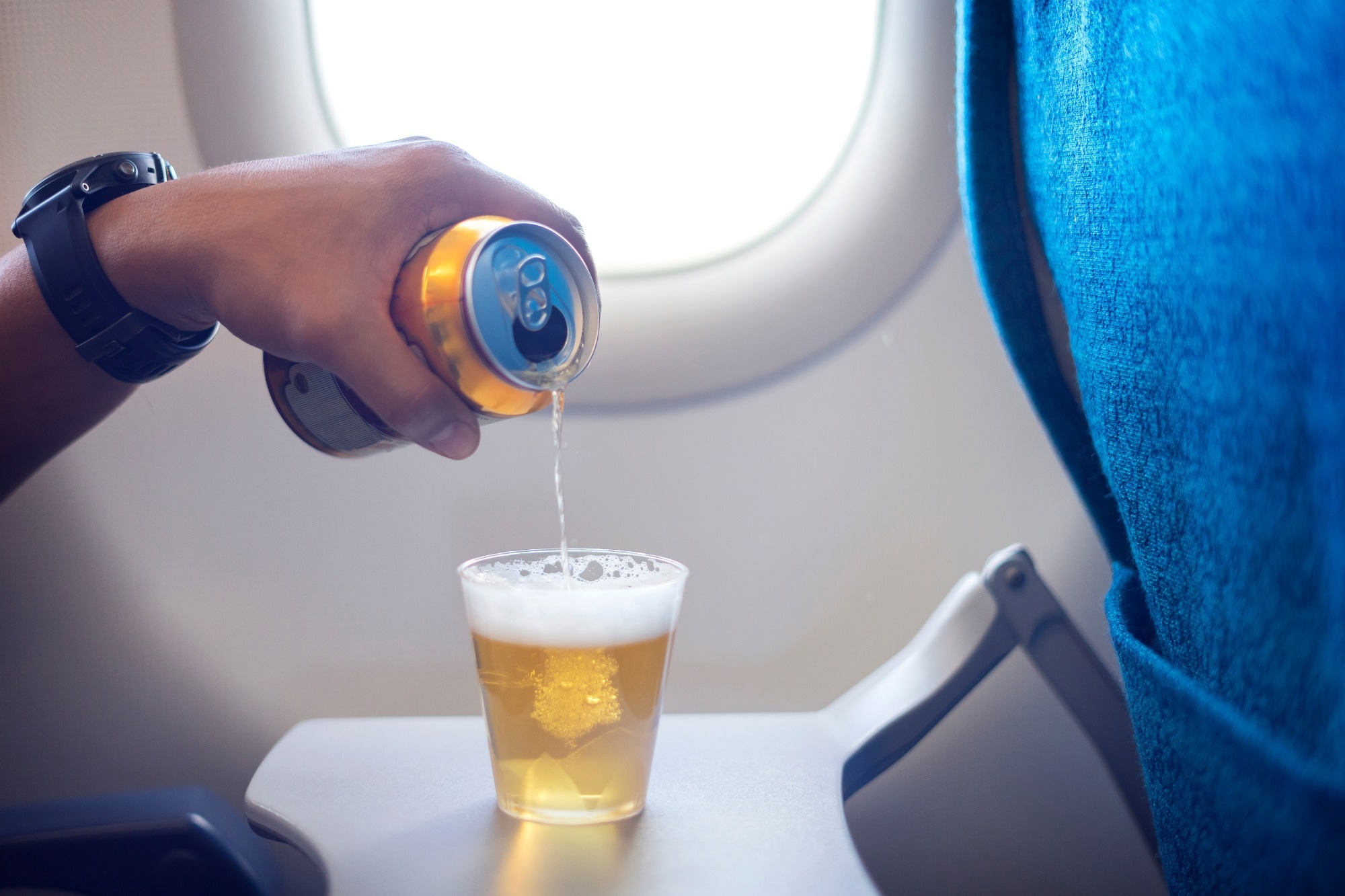Their results indicate that the combination of hypobaric hypoxia and alcohol can reduce the quality of sleep, lead to extended durations of hypoxemia when SpO2 is lower than 90%, and stress the cardiovascular system, with implications for flight passengers who drink alcohol during long-haul flights.
 Study: Effects of moderate alcohol consumption and hypobaric hypoxia: implications for passengers’ sleep, oxygen saturation and heart rate on long-haul flights. Image Credit: PONG HANDSOME/Shutterstock.com
Study: Effects of moderate alcohol consumption and hypobaric hypoxia: implications for passengers’ sleep, oxygen saturation and heart rate on long-haul flights. Image Credit: PONG HANDSOME/Shutterstock.com
Background
Previous research has highlighted that long-haul flights are becoming more common, rising from approximately one billion air travelers in 2002 to four billion 16 years later.
The low cabin pressure on these flights, equivalent to an altitude of 2,438 meters, poses health risks, especially for passengers with respiratory diseases due to reduced arterial oxygen partial pressure (PaO2). This can lead to hypobaric hypoxia, characterized by significantly lower SpO2.
Acclimatization to such conditions is not possible during a flight. Additionally, alcohol consumption, common on long-haul flights, impacts sleep patterns by reducing sleep onset latency (SOL) and rapid eye movement (REM) sleep duration and can cause cognitive and cardiovascular issues.
The combined effects of hypobaric conditions and alcohol consumption on sleep have not been fully explored.
About the study
The study involved 48 participants aged between 18 and 40, randomly allocated to two groups based on gender, body mass index, and age. Exclusions were made for those with circadian, sleep, physical, or psychological disorders.
Conducted at the Institute of Aerospace Medicine, the study compared two groups, Control (normobaric normoxia) and InFlight (hypobaric hypoxia), under two conditions each—without alcohol and with alcohol (target blood alcohol concentration of 0.06%).
Participants slept for four hours (00:00–04:00) in controlled environments, and heart rate, polysomnography, and SpO2 were monitored.
Polysomnography, which a technician scored, included electroencephalography (EEG), electro-oculography, and submental electromyography.
Total sleep time (TST), sleep efficiency, SOL, sleep stage durations, wake after sleep onset (WASO), sleep stage changes, arousals, and heart rates were analyzed.
SpO2 was measured with a fingertip sensor, ensuring participant safety. Data analysis included mixed analysis of variance (ANOVA), Tukey–Kramer adjustments, and Wilcoxon tests for SpO2 comparisons, with significance set at α<0.05 and Bonferroni adjustments applied. Some parameters were transformed for normal distribution and assessed via Kolmogorov–Smirnov tests and Q–Q plots.
Findings
The study found significant effects of hypobaric conditions and moderate alcohol consumption on sleep and physiological parameters.
In the Control Group, alcohol consumption shortened light sleep and REM sleep durations reduced SpO2 during sleep, and increased heart rate. Median SpO2 remained above 90%.
In the InFlight Group without alcohol, REM sleep was shorter, the duration of second-stage sleep was longer, and the likelihood of WASO increased. SpO2 was significantly reduced and dropped below 90% in 81% of TST. Heart rate also increased.
In the InFlight Group, alcohol further decreased REM sleep and showed trends for increased second-stage duration and decreased SOL.
SpO2 was further reduced with time spent below 90% SpO2 significantly increased. SpO2 during TST dropped to 85.32% from 88.07% without alcohol. Heart rate increased under combined conditions.
Alcohol combined with hypobaric conditions had a supra-additive effect, significantly reducing SpO2 and increasing heart rate more in the InFlight Group than in the Control Group.
Hypobaric hypoxia further exacerbated the effects of alcohol, leading to a more pronounced decline in SpO2 and increased heart rate compared to normobaric conditions.
These results highlight the compounded negative effects of alcohol and hypobaric conditions on sleep quality and physiological health during long-haul flights.
Conclusions
The study highlighted the compounded effects of moderate alcohol consumption and hypobaric conditions on the quality of sleep, heart rate, and SpO2, which are particularly relevant for airline passengers.
The combined exposure led to significant reductions in REM and third-stage sleep durations, decreased SpO2 to a median of 85%, and increased heart rate to 88 beats per minute (median), indicating substantial cardiac strain even in healthy individuals.
The study's strengths include its realistic simulation of flight conditions and focus on both sober and alcohol-influenced states. However, the limited sample size, short sleep duration, and specific conditions (e.g., sleeping positions) limit generalizability.
Future research should explore longer sleep durations, including a more diverse participant pool, and consider different seating positions to better reflect typical inflight experiences.
Additionally, investigating the effects on older adults and individuals with pre-existing health conditions would provide more comprehensive insights into potential risks during flights.
Journal reference:
-
Trammer, R.A., Rooney, D., Benderoth, S., Wittkowski, M., Wenzel, J., Elmenhorst, E. (2024) Effects of moderate alcohol consumption and hypobaric hypoxia: implications for passengers’ sleep, oxygen saturation and heart rate on long-haul flights. Thorax. doi: https://doi.org/10.1136/thorax-2023-220998. https://thorax.bmj.com/content/early/2024/05/03/thorax-2023-220998